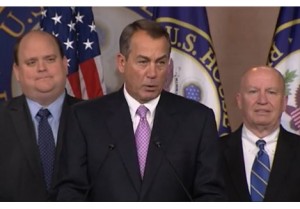NEWS ROUNDUP
Lockout drags on, profits not jobs, GOP-inflicted wound…
Monday, March 4, 2013
LOCAL
► In today’s Columbian — No progress in dispute as port lockout enters 6th day — Both sides indicated things were quiet Sunday night as the United Grain lockout continues into its sixth day Monday morning.
► In Saturday’s Columbian — Union asks grain operators for more talks — Union dockworkers and United Grain Corp. launched a fresh round of maneuverings Friday over the lockout at the Port of Vancouver. Meanwhile, the ILWU is maintaining picket lines, the company is using nonunion labor to operate its terminal, and questions are flying over the stalemate’s potential impacts on overseas agricultural exports.
► In the (Everett) Herald — SPEEA: Boeing technical workers’ ballots due March 18 — The union said that ballots are scheduled for mailing by Thursday and will be due by March 18. SPEEA has said it’s disappointing the offer does not provide defined pensions for new employees. They would, instead, have a 401(k) retirement plan. However, the union says accepting the company’s last offer would lock in “considerable improvements” achieved since the company’s initial offer.
► In the Seattle Times — Hytek, Machinists reach a deal — The first union contract at Esterline’s Kent-based Hytek Finishes unit was narrowly approved by members of the Machinist union less than a week after they rejected an earlier version.
ALSO at The Stand — Hytek employees OK new, improved contract
STATE GOVERNMENT
 ► In the (Everett) Herald — A wise, unpopular decision (editorial) — The two-thirds’ rule sounded like an effective stick to batter lawmakers into not raising taxes. Instead, it became a case study in unintended consequences, of corporations preserving their loopholes while lawmakers gave state universities the OK to hike tuition. In the long view of history, the requirement is inconsistent with how representative government is designed to work… If there’s chatter about revenue, it should focus on exemptions. Meanwhile, lawmakers need to tackle the big kahuna, the state’s paramount duty, fully funding K-12 education.
► In the (Everett) Herald — A wise, unpopular decision (editorial) — The two-thirds’ rule sounded like an effective stick to batter lawmakers into not raising taxes. Instead, it became a case study in unintended consequences, of corporations preserving their loopholes while lawmakers gave state universities the OK to hike tuition. In the long view of history, the requirement is inconsistent with how representative government is designed to work… If there’s chatter about revenue, it should focus on exemptions. Meanwhile, lawmakers need to tackle the big kahuna, the state’s paramount duty, fully funding K-12 education.
ALSO at The Stand — WSLC’s Jeff Johnson: Court decision ends ‘tyranny of the minority’
► In the Spokesman-Review — Washington tax system not broken, just flawed — In his response to the Supreme Court ruling, Rep. Joel Kretz (R-Wauconda) complained, “We constantly see paid lobbyists in Olympia representing special-interest groups that want more taxpayer money for their social programs.” He did not mention the legion of special-interest business lobbyists intent on preserving every one of the hundreds of loopholes that cost states and localities billions in lost revenue. And any lobbyist worth a paycheck can rally 17 Senate votes — one-third of 50 — to spike a change.
► At TVW’s Capitol Record — House committee passes paid sick leave bill — Sick Washingtonians may feel a little better soon, as they may be able to stay home without giving up their pay. The House Appropriations Committee passed a bill on Friday that would require employers to allow employees to take paid sick days.
► In today’s Columbian — Legislative session: Halfway done, but a long way to go — As the 2013 Washington legislative session nears its halfway mark, the biggest policy battles remain unsettled. Faced with a new political climate, with one chamber run by Democrats and the other run by conservatives, legislators are gearing up for debates about paying for K-12 education and the state’s transportation projects, including the Columbia River Crossing.
 ► In the Columbian — GOP vows transportation savings — Unlike the House Democrats’ transportation package, a funding proposal that specifically marks $450 million for the CRC project, the Republicans’ bill package is not about funding projects. Instead, it focuses on proposed reforms aimed at reducing the state’s transportation costs, said Rep. Ed Orcutt (R-Kalama). If those savings are achieved, Orcutt said, Republicans might be willing to put some of those savings toward the state’s most crucial transportation needs.
► In the Columbian — GOP vows transportation savings — Unlike the House Democrats’ transportation package, a funding proposal that specifically marks $450 million for the CRC project, the Republicans’ bill package is not about funding projects. Instead, it focuses on proposed reforms aimed at reducing the state’s transportation costs, said Rep. Ed Orcutt (R-Kalama). If those savings are achieved, Orcutt said, Republicans might be willing to put some of those savings toward the state’s most crucial transportation needs.
EDITOR’S NOTE — Meanwhile in Oregon, last week the House voted 45-11 to approve $450 million for the CRC, and today the Senate is expected to approve it as well. There do not appear to be any GOP plans to try to hold the CRC project — much less the state’s entire transportation budget — hostage in order to force ideologically motivated “reforms.” Speaking of which…
► In the (Longview) Daily News — Hoping prevailing wages don’t prevail (by Art Hyland) — I’m engaged in an effort to convince our Legislature to exempt rural school districts from high-cost state prevailing wage requirements. I’d like to publicly thank State Sen. Brian Hatfield (D-Raymond) for agreeing to sponsor this bill.
► In today’s (Longview) Daily News — Sen. Braun’s workers’ comp bill derailed — State Sen. John Braun’s (R-Centralia) bill to privatize the state-run workers’ compensation program failed to get out of committee and is likely dead this session.
► In today’s Seattle Times — Senate GOP scales back education agenda — State Senate Republicans, who seized power this session in part to push sweeping change to the state’s public-school system, appear to be scaling back their wish list. Maybe a majority isn’t all it’s cracked up to be.
► In the Seattle Times — Changes loom for Washington public pension system — An analysis by The Seattle Times suggests that the system’s promised benefits are much bigger, and its real assets smaller, than official numbers indicate.
 ► In today’s Seattle Times — Agreement reached on EpiPen bill — Potentially lifesaving allergy medication may soon be available to more students, thanks to an agreement reached last week by lawmakers and a school-nurses organization.
► In today’s Seattle Times — Agreement reached on EpiPen bill — Potentially lifesaving allergy medication may soon be available to more students, thanks to an agreement reached last week by lawmakers and a school-nurses organization.
EDITOR’S NOTE — Last week, the Times inaccurately reported that a school nurses union was blocking the bill, later correcting that it was a trade association. Of course, its dramatic headline suggesting a union was blocking a bill to keep children safe generated lots of union-bashing in the comment thread (and elsewhere, no doubt) before it was corrected. And that was why it was initially considered newsworthy at the Times. The noncontroversial bill — which had issues resolved during the public hearing/vetting process like ALL bills do — would never have merited coverage in the first place had the reporter not mistakenly identified the group as a union.
NATIONAL
► In today’s NY Times — Recovery in U.S. is lifting profits, but not adding jobs — With the Dow Jones industrial average flirting with a record high, the split between American workers and the companies that employ them is widening and could worsen in the next few months as federal budget cuts take hold.
 ► In today’s NY Times — Mooching off Medicaid (by Paul Krugman) — Why would Republicans insist on privatizing a health program that is already public, and that does a much better job than the private sector of controlling costs? The answer is pretty obvious: the flip side of higher taxpayer costs is higher medical-industry profits. So ignore all the talk about too much government spending and too much aid to moochers who don’t deserve it. As long as the spending ends up lining the right pockets, and the undeserving beneficiaries of public largess are politically connected corporations, conservatives with actual power seem to like Big Government just fine.
► In today’s NY Times — Mooching off Medicaid (by Paul Krugman) — Why would Republicans insist on privatizing a health program that is already public, and that does a much better job than the private sector of controlling costs? The answer is pretty obvious: the flip side of higher taxpayer costs is higher medical-industry profits. So ignore all the talk about too much government spending and too much aid to moochers who don’t deserve it. As long as the spending ends up lining the right pockets, and the undeserving beneficiaries of public largess are politically connected corporations, conservatives with actual power seem to like Big Government just fine.
► In today’s NY Times — Obama asks health plans to report rising rates — The Obama administration says it will require health insurance companies to report all price increases, no matter how small, to the federal government so officials can monitor the impact of the new health care law and insurers’ compliance with it.
► At AFL-CIO Now — Safety issues at ExxonMobil refinery ‘universal’ throughout industry, USW says — The safety issues the EPA uncovered in a July 2012 inspection of ExxonMobil’s Baton Rouge, La., refinery are the same issues that are prevalent in many U.S. refineries, including those that were the sites of two fatal disasters, the United Steelworkers say.
► In the LA Times — Despite Colombia’s efforts, labor union officials’ lives at risk — The U.S. Embassy in Bogota issues a statement condemning ‘threats and recent attacks.’ Last year, about 20 union leaders were killed and 90 kidnapped.
SEQUESTER
► In today’s NY Times — As cuts take effect, poor may be hit hardest — The sequestration cuts contain billions of dollars in mandatory budget reductions in programs that help low-income Americans, including one that gives vouchers for housing to the poor and disabled and another that provides fortified baby formula to the children of poor women.
 ► In today’s Washington Post — Deal to avert government shutdown likely, officials say — Congress returns to work this week with no plan to reverse across-the-board spending cuts that took effect Friday, but with hope on both sides of the aisle of averting an end-of-the-month showdown that could result in a government shutdown. The House plans to vote Thursday on a spending measure that would keep the government running after its current funding mechanism elapses March 27.
► In today’s Washington Post — Deal to avert government shutdown likely, officials say — Congress returns to work this week with no plan to reverse across-the-board spending cuts that took effect Friday, but with hope on both sides of the aisle of averting an end-of-the-month showdown that could result in a government shutdown. The House plans to vote Thursday on a spending measure that would keep the government running after its current funding mechanism elapses March 27.
EDITOR’S NOTE — Gee, thanks!
► From AP — U.S. economy hamstrung by D.C. brinkmanship — Thousands of businesses, from defense contractors to wind turbine manufacturers to wheat farmers, have laid off employees or slowed hiring because partisan brinksmanship over the budget has sown confusion among federal agencies. It is one reason the U.S. economic recovery has been so persistently anemic. But it is happening quietly, drowned out by dueling press conferences inside the Beltway and general disgust at the perpetual drama over federal spending.
TODAY’S MUST READ
 ► At Time.com — The sequester is a Republican-inflicted wound (by Michael Grunwald) — The sequester is here, with an initial $85 billion worth of haphazard and economically destructive spending cuts, a Washington wound almost universally described as “self-inflicted.” Let’s be clearer: It’s Republican-inflicted. It is a direct result of the insistence by GOP leaders in the summer of 2011 that they would not raise the federal debt ceiling unless President Obama agreed to dramatic spending cuts. One can argue that the growth of the debt or the size of the government justified that insistence; I’d disagree. But it’s simply a fact that every budget crisis of the last two years—the downgrade of the U.S. credit rating, the failure of the “supercommittee,” the fiscal cliff, and now this — stems from Republican debt-limit brinksmanship.
► At Time.com — The sequester is a Republican-inflicted wound (by Michael Grunwald) — The sequester is here, with an initial $85 billion worth of haphazard and economically destructive spending cuts, a Washington wound almost universally described as “self-inflicted.” Let’s be clearer: It’s Republican-inflicted. It is a direct result of the insistence by GOP leaders in the summer of 2011 that they would not raise the federal debt ceiling unless President Obama agreed to dramatic spending cuts. One can argue that the growth of the debt or the size of the government justified that insistence; I’d disagree. But it’s simply a fact that every budget crisis of the last two years—the downgrade of the U.S. credit rating, the failure of the “supercommittee,” the fiscal cliff, and now this — stems from Republican debt-limit brinksmanship.
This is what makes all the Beltway back-and-forth that came up with the sequester, and who moved which goalposts, and what Gene Sperling said to Bob Woodward, so annoying. The origin of this mess is absolutely clear. It was created by the Budget Control Act of 2011, the ransom Republican leaders received for agreeing to let the U.S. government pay its bills.
The Stand posts links to Washington state and national news of interest every weekday morning by 10 a.m.





